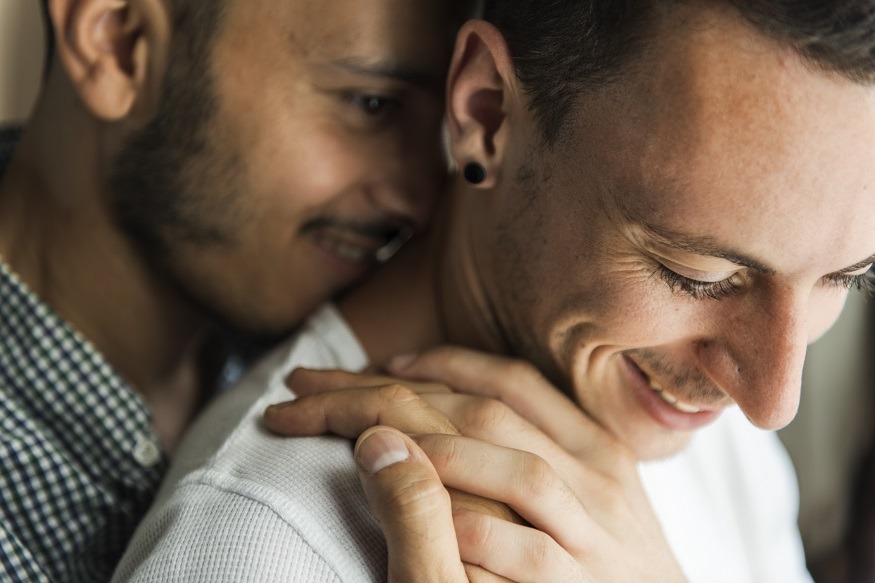
Bicurious? When you’re also interested in the other sex

For example: you’re a woman who has a relationship with a man and for as long as you can remember, you’ve only been attracted to men. In other words: you’re straight. However, you’re also very attracted to that one female colleague – more attracted than to your girlfriends – and you really want to explore those feelings. This is called bicurious. What is it exactly and how do you deal with it? We will find out in this blog post.
Bicurious: what is it?
The definition of bicurious first appeared in various dictionaries in the nineties, which read: interested in exploring and experimenting with bisexuality. If you’re bicurious, then you identify as straight or gay, or you’re in a straight or gay relationship, but you’re interested in a (sexual) relationship with someone of the opposite sex (if you’re gay) or the same sex (if you’re straight). For example when a man who’s in a relationship with a woman is curious about having sex or entering a relationship with a woman. Bicurious is sometimes also called heteroflexible or homoflexible.
The difference between bisexuality and bicurious
Bisexuality means that a man or a woman is attracted to both sexes. It doesn’t matter if someone is a man or a woman. If you’re bicurious, you’re mostly just curious about what it would be like to be with someone of your own sex (if you’re straight) or someone of the opposite sex (if you’re gay). Generally speaking, people who identify as bicurious are mostly girls. They want to explore their sexual identity, but don’t necessarily want to identify as bisexual (yet).
Not everyone likes the term bicurious. Gabrielle Alexa, writer and founder of the Bi Girls Club: “To me, it feels like you can only call yourself bicurious if you already have some experience with sexual or romantic relationships in order to make it legitimate. I don’t agree with that.” It feels like part of bi-erasure, which is when biseksuality is dismissed and denied. Alexa: “Bisexuals always have to prove themselves. As a bi-woman with a male partner, you have to prove you’re not straight. Why don’t bicurious people just identify as bisexual?”
How do you know if you’re bicurious?
Fantasizing about your best friend’s soft lips or feeling flushed when you see a seductive flash of sexy Ruby Rose: it isn’t strange at all. It used to be common to be either 100% straight or 100% gay, but those lines start to fade. This is also because nowadays people are allowed to and able to admit their desires more and more. It’s possible that that one kiss you shared with another woman in a club suddenly tastes like more. Do you experience feelings like this? Then you might be bicurious. This is not necessarily information you have to do anything with, and you don’t have to identify as bicurious if you don’t want to. But if you like to know more about it, then read on.
How do I deal with being bicurious?
Do you think you’re bicurious and do you want to know what to do with it? Perhaps our tips can help you.
1. Talk about it with your partner
If you’re in a relationship, it’s good to talk about your feelings. By doing this, you acknowledge to yourself that your feelings are valid. It would be great for you if your partner is open to these feelings and gives you a chance to explore them. This can be fun for your partner as well, as explained in tip 4.
2. Watch porn
You might not expect this tip, but according to Dr. Justin Lehmiller, researcher at the Kinsey Institute, many people watch porn because it’s a safe way to discover what arouses them. It’s a good solution if you don’t necessarily want to have sex with someone to explore your feelings.
3. Talk about it with others
If you don’t want to talk about your bicurious feelings with people you know, try talking to strangers via dating apps or chatrooms. This way you can find out if you do indeed get aroused by sexy conversations with another woman or whether you really enjoy the naughty pictures you receive or not. It’s a pleasant way of anonymously discovering what you do and do not feel.
4. Go for a threesome with another woman
Example: you really want to explore if you’re also attracted to women, but at the moment you’re in a relationship with a man. Try asking him if he’s okay with another woman participating in your sexual adventures. Wanna bet he says yes? If you’re smart, choose a woman you don’t know. Having a threesome gives you the opportunity to experience in real life what it’s like to kiss another woman and to touch her soft breasts. Bicurious men are interested in having threesomes as well, according to Lehmiller’s research. This way they can explore their feelings for other men or women while their partner also has a good time. Besides, the presence of a partner makes the experience less intimidating.
5. Work on your shame – if you experience it
Let’s start by saying that there’s absolutely no need to be ashamed of any sexual identity. Still, it’s possible that you feel ashamed of being bicurious. There’s a good book that Jor-El Caraballo, a psychologist who mainly works with LGBTQ+ clients, recommends. This book is called The Power of Vulnerability by Brené Brown. Her TED Talk on this topic has been viewed more than 47 million times.
6. You might not get a clear answer right away
Know that you might not get a clear answer on your search for your sexual identity. Perhaps it remains unclear whether you’re bicurious or not even after you kissed another woman. It can take years and you might never find a clear answer.
7. Tell the people you’re close to that you’re bicurious
Now that you know how you feel and found a way to conquer your shame, it’s time to tell the most important people in your life about your identity. For example your partner, if you haven’t already, your parents, and even your best friends. You don’t necessarily have to come out, but casually mentioning it during a family barbecue might not be the best idea either. Sit down with your family or friends, take your time, and tell them how you feel. Some people will have questions. Try to answer them if you know what to say.
8. Talk about it with a therapist
Are you struggling with your identity? It can help to talk about it with a therapist. Perhaps he or she can help you find your sexual identity. Or maybe you’ll discover that putting a label on yourself isn’t that important to you. In any case, you can talk about your desires with your therapist and get a clearer idea of your identity.
9. Trying it once doesn’t make you different
Are you afraid that your identity will change because you’re a straight woman who had sex with another woman once? In that case, we can say: don’t worry about it. Yours truly, the author of this blog post, used to be a wild college student and in my college days many women used to kiss or have sex with each other. Most of them are now married to a man. This illustrates that trying it once doesn’t make you gay, in case you’re worried about that. And even if it does, then it’s great that you found your sexual identity.







Respond or ask a question
0 comments